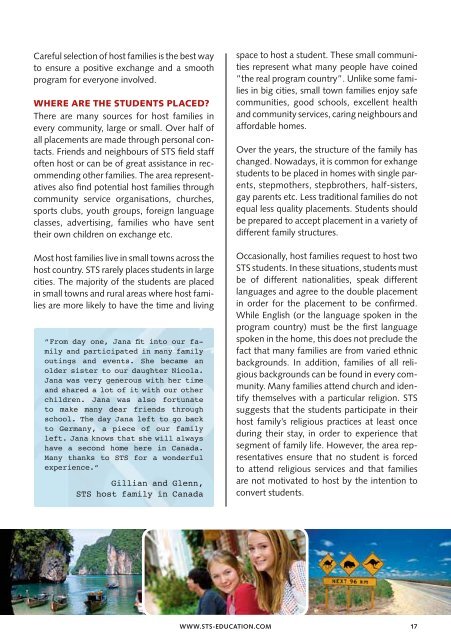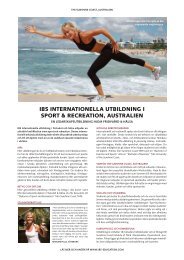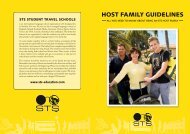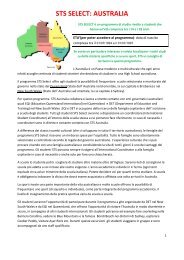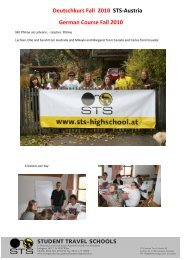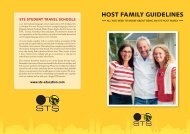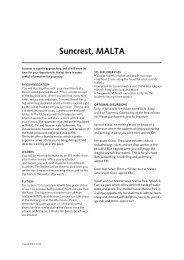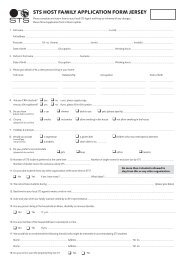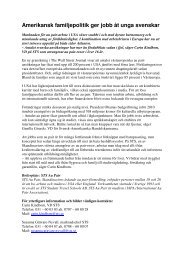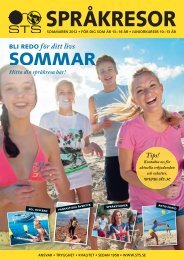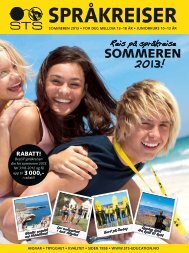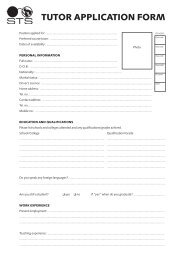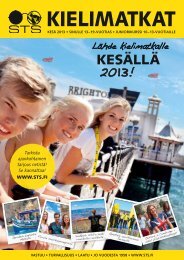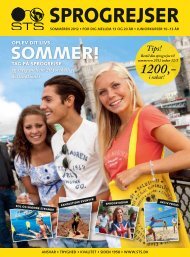Create successful ePaper yourself
Turn your PDF publications into a flip-book with our unique Google optimized e-Paper software.
Careful selection of host families is the best way<br />
to ensure a positive exchange and a smooth<br />
program for everyone involved.<br />
WHeRe aRe tHe StuDentS placeD?<br />
There are many sources for host families in<br />
every community, large or small. Over half of<br />
all placements are made through personal contacts.<br />
Friends and neighbours of <strong>STS</strong> field staff<br />
often host or can be of great assistance in recommending<br />
other families. The area representatives<br />
also find potential host families through<br />
community service organisations, churches,<br />
sports clubs, youth groups, foreign language<br />
classes, advertising, families who have sent<br />
their own children on exchange etc.<br />
Most host families live in small towns across the<br />
host country. <strong>STS</strong> rarely places students in large<br />
cities. The majority of the students are placed<br />
in small towns and rural areas where host families<br />
are more likely to have the time and living<br />
”From day one, Jana fit into our family<br />
and participated in many family<br />
outings and events. She became an<br />
older sister to our daughter Nicola.<br />
Jana was very generous with her time<br />
and shared a lot of it with our other<br />
children. Jana was also fortunate<br />
to make many dear friends through<br />
school. The day Jana left to go back<br />
to Germany, a piece of our family<br />
left. Jana knows that she will always<br />
have a second home here in Canada.<br />
Many thanks to <strong>STS</strong> for a wonderful<br />
experience.”<br />
Gillian and Glenn,<br />
<strong>STS</strong> host family in Canada<br />
space to host a student. These small communities<br />
represent what many people have coined<br />
”the real program country”. Unlike some families<br />
in big cities, small town families enjoy safe<br />
communities, good schools, excellent health<br />
and community services, caring neighbours and<br />
affordable homes.<br />
Over the years, the structure of the family has<br />
changed. Nowadays, it is common for exhange<br />
students to be placed in homes with single parents,<br />
stepmothers, stepbrothers, half-sisters,<br />
gay parents etc. Less traditional families do not<br />
equal less quality placements. Students should<br />
be prepared to accept placement in a variety of<br />
different family structures.<br />
Occasionally, host families request to host two<br />
<strong>STS</strong> students. In these situations, students must<br />
be of different nationalities, speak different<br />
languages and agree to the double placement<br />
in order for the placement to be confirmed.<br />
While English (or the language spoken in the<br />
program country) must be the first language<br />
spoken in the home, this does not preclude the<br />
fact that many families are from varied ethnic<br />
backgrounds. In addition, families of all religious<br />
backgrounds can be found in every community.<br />
Many families attend church and identify<br />
themselves with a particular religion. <strong>STS</strong><br />
suggests that the students participate in their<br />
host family’s religious practices at least once<br />
during their stay, in order to experience that<br />
segment of family life. However, the area representatives<br />
ensure that no student is forced<br />
to attend religious services and that families<br />
are not motivated to host by the intention to<br />
convert students.<br />
WWW.<strong>STS</strong>-educaTion.com 17


